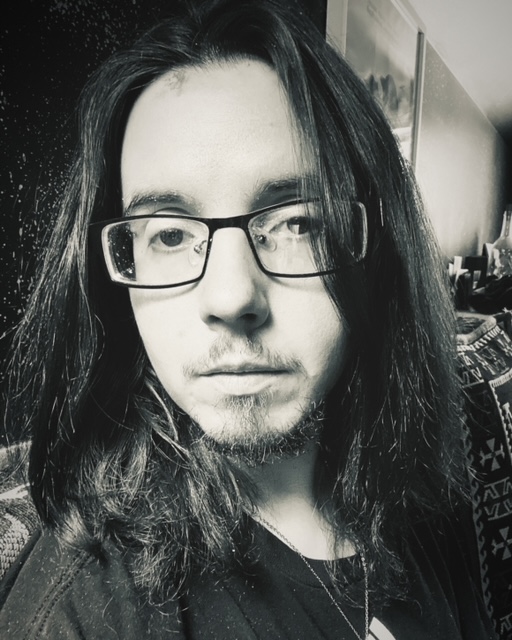When did you first encounter poetry? How did you discover that you wanted to write poems?
I’ve been an avid (and advanced) reader since I was in 1st grade, but I think I truly discovered poetry through music. All the way into college I wanted to be a musician, but music is a major you have to try out for. So I decided to enter university as an English major, and then if I didn’t make the cut for the music major the first time, I could always try again. But I never ended up trying out, not even once – I took a creative writing class my first semester and it lit a fire in me that has yet to be put out.
Do you have a writing routine? A favorite time or place to write?
I always have a notebook on me in case inspiration strikes, but most of my writing happens on my couch, after I’ve had time to wind down from work and before I go to bed. I also get a lot of stimulation from writing in cafes and bars, and so if I’m going out on the weekend I’ll sometimes get to the event a few hours early on purpose so I can write.
Where do your poems most often “come from”—an image, a sound, a phrase, an idea?
90% of my poems start with language – something that I overheard, that I misread, that someone texted me. But a cohesive piece doesn’t really start to form until I’ve paired that language with an idea – typically something that I can’t get out of my head. Whether I’m deeply freaked out by something or intrigued by something or upset by something or fantasizing about something, etc. etc. etc…. when I realize I’m spiraling around something, that’s when I know it’s time to write a poem.
Which writers (living or dead) have influenced you the most?
I have to give the most credit to the Romantics, especially Lord Byron and Percy Shelley. While they didn’t exactly inspire me to write, reading “Darkness” by Lord Byron was like getting struck by lighting – it was the first time I can remember really having the wind knocked out of me by a poem. But I think the Russian writers of the Silver Age and the early Soviet avant-garde have had the most impact on my poems themselves, especially Mikhail Kuzmin, Velimer Khlebnikov, and of course Vladimiar Mayakovsky. The Russian avant-garde treated poetry as music, visual art, and drama all wrapped into one, and I find myself returning to them again and again for inspiration when I feel like my writing has become stagnant or self-conscious.
But there are so many brilliant writers and poets that have opened doors for me, too many to list here! So some individual shout-outs will go to (living and dead…) Virginia Woolf, Hagiwara Sakutaro, Kazim Ali, Jack Kerouac, Anna Akhmatova, and Cameron Awkward-Rich.
What excites you most about your new collection?
I do a lot of different things in this chapbook – there are long sequence poems and tiny, half-page pieces. There are narrative poems, lyric poems, abstract poems, protest poems, love poems, and even a little bit of Russian and Arabic. I think the thing I love most about hunting the bugs is that it’s doing a lot for a little book. I often feel like I don’t quite fit in whatever group I’m in – I feel like I have a lot of different passions, interests, and social circles that might not seem to fit together. And so I’m glad that my book seems to be made of many different pieces, too, ones that speak to each other in ways that (I hope!) are fresh and engaging.



Jack Giaour (he/him/his) is a gay, trans, and neurodivergent poet. His chapbook hunting the bugs won the 2023/2024 BOOM Chapbook prize from Bateau Press, and his poems have appeared or are forthcoming in Nixes Mate Review, Albatross, and Fourteen Hills, among other journals. He sunlights as software manager for a steel fabricator on the north shore of Boston.
